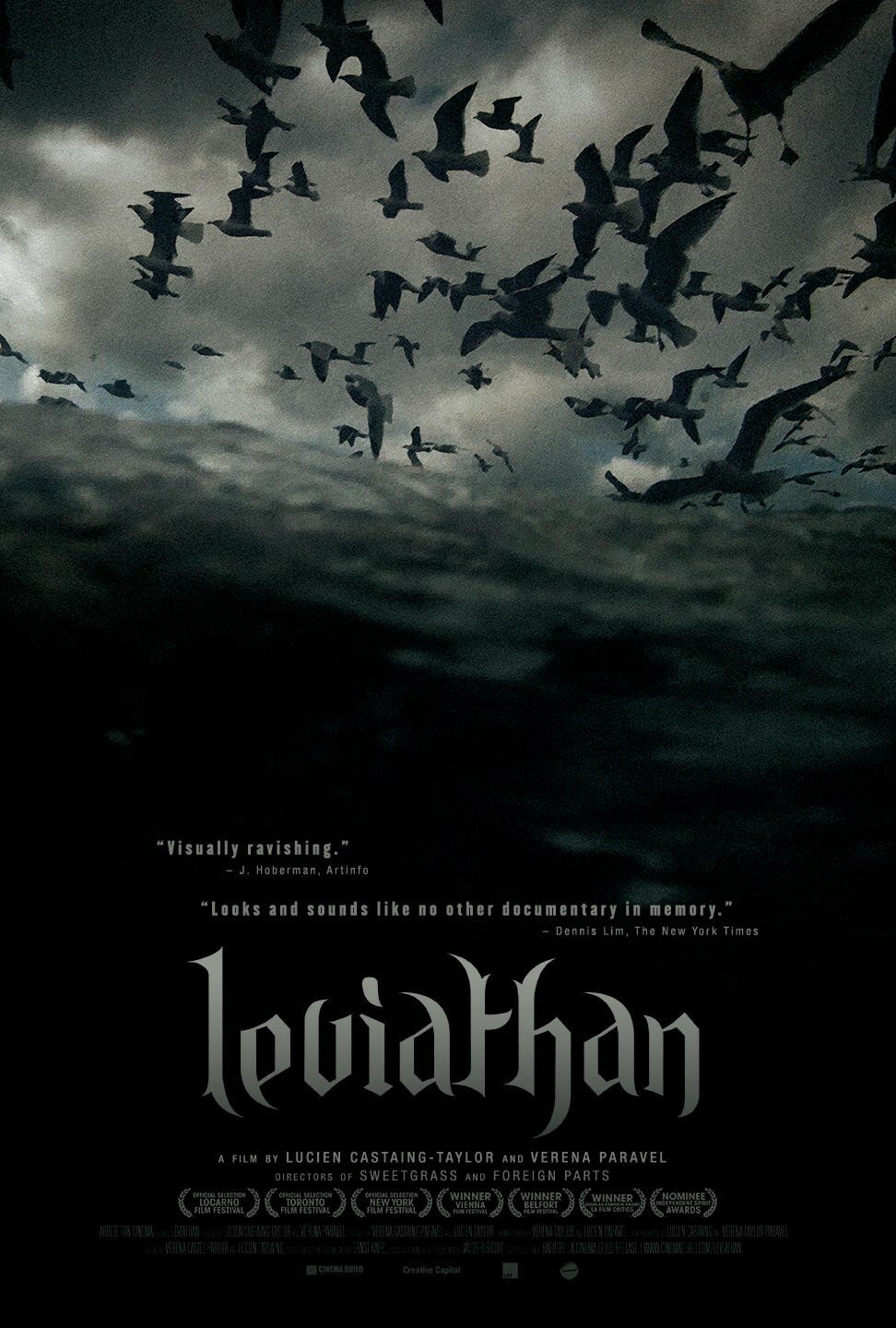Northwest Film Forum‘s showing of the documentary Leviathan is nearing the end (May 2) of its extended run, at which point you’ll have to find another source for lengthy closeups of fish viscera swirling about in a fishing boat’s bowels. It’s fair to call the film a documentary, but it’s unlike most of the recent agitprop crop in its quest for an immersive experience, rather than one mediated by argumentative discourse. As NPR explains, the film’s creators, Lucien Castaing-Taylor and Verena Paravel, are both from Harvard University’s Sensory Ethnography Lab, which “encourages art that explores the sensory experience of being inside a particular culture.”
If you’ve been to sea (Seattle movie-goers may be more likely to answer in the affirmative), it may not be quite as disorienting as it is for the landlocked. Familiarity with boat- and sea-sounds will let you identify the ship’s engine, the whine and groan of its winches, and the wind slapping through cables, even though a good portion of the goings-on take place at night, darkness all around outside a cone of light. Speech is mostly absent (except for the scene where an exhausted captain dozes to an episode of Deadliest Catch), and there’s no voiceover at all.
Then there’s what you choose to make of what you see, which is sometimes otherworldly and beautiful, sometimes this-worldly and stomach-churning. The filming was largely done with a series of small cameras mounted to people’s chests or attached to places people couldn’t go (trailing through the water after the boat like a net). In one long, mesmerizing sequence, the sea is rightside-up, and scores of upside-down gulls course after the boat each time the camera surfaces in a wave trough. You also see tons of net-crushed fish, eyes popped out, squirt from the net into a hold, where later they’ll be gutted, the camera picked up the way the deck swims in blood.
At times the camera joins the lifeless or near lifeless carcasses as they float about, the ship making its wallowing way, or watches the bloody water spill out the ship’s sides, with gulls in pursuit. With no clear purpose — you begin the film aboard the ship and end it there, 87 minutes later — much rests upon your capacity to patiently witness without demanding further justification.
Night Across the Street, also at the Film Forum, also ends its run on May 2. For those who know Chilean filmmaker Raúl Ruiz from his magisterial costume-drama Mysteries of Lisbon, some preoccupations (lost love, suicide) may seem familiar, but Night‘s structure is much more poetic and associational than it is narratively causal. Ruiz spares no effort in ensuring that his film teaches you how to watch it: There are imaginary (well, it’s all imaginary, a phenomenology of mind) dialogues with French novelist Jean Giono that set up the film as a game of marbles, watching discrete events whether fantasized or “real” clack against each other.
So it is that the film contains a young boy who also appears to be the old man on the verge of retirement (both have conversations with Long John Silver, but I think only the boy talks with Beethoven, who becomes outraged when he’s taken to a movie theater and hears his music* in a Western, à la the William Tell Overture and The Lone Ranger). The boy has gotten a bad grade in math that he’s trying to weasel out of, but he’s frequently derailed and detoured in that dreamlike way that is called Fellini-esque. The retiree, in contrast, lives in a boarding house that is a nest of conspiracy, and is sure that someone means to kill him.
The confabulation can be so intense that you lose your bearings. Who’s an orphan? Is that pile of bodies a reference to something? Are those the boy’s real parents? To connect scenes, Ruiz may make them rhyme (a scene ends with a character mentioning one topic, and another opens with a character riffing on the same thing), or create repetitions (horizon, wind, boat). Mirrors abound (as do doorways that seem to be mirrors), as do mentions of Mallarmé, the symbolist poet. Drama loses intensity in the realm of symbol — a death can merely mean that someone left, or was transformed.
*I think it may have been a piece by Beethoven. The scene went by before I was sure what was happening.
Ken Loach’s The Angels’ Share opens May 3 at SIFF Cinema Uptown. It stars a gang of teen or twenty-something Glaswegians who, though not incorrigible, have had their brushes with the law. Paul Laverty was Loach’s writing partner so it’s not clear who shoulders the responsibility for the paint-by-social-consciousness-numbers way that the film gets to its feet. You meet ringleader Robbie (a wiry, scarred, track-suited Paul Brannigan) as his girlfriend is about to give birth to their child, and the event provides the conventional catalyst for his reform, though Loach — while making it clear that Robbie’s environment played its part — doesn’t shirk from showing the drug-fueled viciousness that Robbie is trying to escape with his social striving.
Initially, the characters’ dialogue doesn’t leave much room for subtext — if having a baby has changed things, by god, someone will state for the record that, yes, having a baby has changed things. But just as you’re settling back for a gritty-but-trite story of personal redemption told with a Scottish burr, Loach switches it up on you, and the film becomes a low-fi heist movie, with some Scotch tastings thrown in. It’s remarkably casual, a little like mumblecore in its artless observation of people’s interactions, except that yes, they do seem to be plotting a theft, and the movie (which you thought was prodding for the straight and narrow) digs into its popcorn and applauds their ingenuity.



